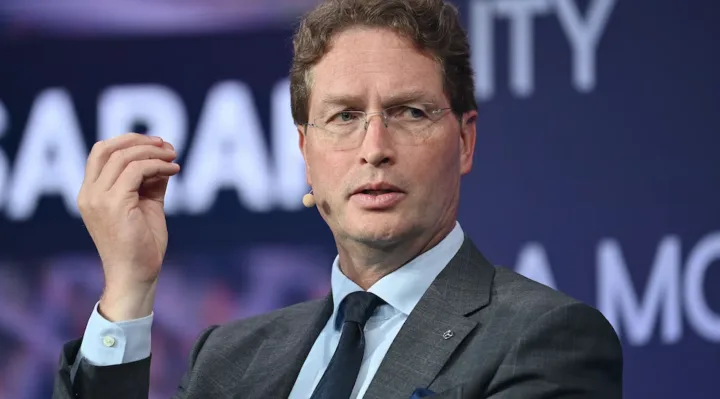European car industry against CO2 fines
Ola Källenius wants softer climate protection rule filtru ulei bosch pret.

Looser environmental measures and the removal of trade restrictions: as president of the ACEA automobile manufacturers' union, Mercedes boss Ola Källenius is urging EU leaders for more flexibility.
The automotive industry is the heart of the European economy and needs the support of Europe's top politicians. The EU must address Trump and China. This is what Ola Källenius, the new president of the European Automobile Manufacturers' Association ACEA, is saying to the European Commission and the European Parliament. His open letter to the EU leadership is available at.
The Mercedes boss is one of the most influential automotive figures in Europe and has reason to be unhappy. The European car industry is currently facing a strong headwind: a sales slump, tightening environmental regulations, an influx of state-subsidized cars from China and the new US president Donald Trump (who is also threatening Europe with punitive tariffs). In other words, Europe's car industry is in crisis. Källenius, who was born in Sweden and holds a German passport, is now taking over as chairman of ACEA, which represents the interests of the European car industry.
Källenius calls for more flexible EU rules
In his appeal to senior European politicians, he is more than clear: during the transformation process, the European Commission and the European Parliament must create the right framework conditions so that the automotive industry can recover. It represents seven percent of the economy, employs over 13 million people and generates more than €390 billion in tax revenue. The automotive industry is central to prosperity, innovation and future prospects, writes Källenius in an open letter, because: “Europe’s economy and our industry are at a crossroads: now is the time to create the right framework to write new chapters of a success story. Specifically: the European automotive industry depends on political support from the EU during the transformation process.
Waiver of fines for fleet CO₂ violations
That is why Källenius is calling for a departure from the EU’s previous plan for fleet rules based on CO2 emissions, which would have led to large fines for carmakers if they failed to comply. “We need a realistic path to decarbonise the European car industry – one that is market-based, not punitive.” The rules should provide the framework for economic growth and better competitiveness, but not restrict it. The EU should therefore act more flexibly with the Green Deal. Fines for violating CO2 limits would, so to speak, burn money for developing new technologies and discourage investment – especially in the “critical phase of the transformation”. Källenius did not comment on the end of the internal combustion engine by 2035, but he is pushing for a more flexible approach. The new EU climate commissioner, Wopke Hoekstra, recently spoke out in favour of keeping the plans.
The transformation speed is too high.
In the transition to electric mobility, the pace will be set by car buyers and market conditions, rather than the pace being set by the EU. That is, a system of incentives would be more appropriate to promote zero-emission mobility, these could be monetary or non-monetary incentives. This would allow the market itself to drive the change.
Decarbonization, promotion of renewable energy and the price of CO₂ emissions
Regarding the success of decarbonisation, Källenius writes: “The focus is on the good availability of affordable energy.” This would have a positive impact on car production in Europe. The rules on CO₂ emissions taxes, which are only set until 2026, should become binding in the longer term so that the car industry can adapt to them.
Current forecasts are outdated – few could have foreseen the current geopolitical and economic conditions. Therefore, policy rules in Europe will have to be adapted to reality, which includes not only CO2 emission rules for passenger cars, but also those for heavy goods vehicles.
Networking with important industry sectors
Källenius criticizes the tunnel-thinking of industrial policy: “We need to involve energy providers, network providers, telecommunications and IT companies, to name a few.” This would be crucial for expanding hydrogen charging and refueling infrastructure across the EU. It would also be important for securing the most important raw materials.
Better trade relations with the US and China
According to the ACEA president, there is currently a risk that the EU, the US and China will drift apart politically and commercially. Europe must choose the right course between cooperation and confrontation: “We Europeans have gained from the opening of markets and free trade in recent decades.” Europe would lose a lot if this development were to reverse now, that is, markets were to close and trade was to be restricted. Nobody would gain from protectionism, writes Källenius, which can only be seen as a clear appeal to Donald Trump. The dispute over the EU’s punitive tariffs on Chinese electric cars is also worrying the Mercedes boss. He calls for a quick and positive resolution to the dispute.
The EU must now adopt bold reforms to make the economy and industry fit for the future. ACEA and the automotive industry are ready to actively shape the transformation and improve Europe's competitiveness.
- 2025-03-11 - Datsun 280Z: the affordable GT image
- 2025-03-10 - BMW 745i (E65) – true luxury for 20 thousand leva?
- 2025-03-09 - Toyota launching a small Land Cruiser as early as 2025?
- 2025-03-08 - BYD integrates drones and hangars for them into its cars
- 2025-03-07 - Barkas B1000: the first and only
- 2025-03-06 - Formentor – a good choice
- 2025-03-05 - Test: BMW iX is an excellent car for a long journey
- 2025-03-04 - Used car: Mazda CX-5
- 2025-03-03 - The world's most extreme Cybertruck
- 2025-03-01 - FIAT reports 62% growth in the Bulgarian market












